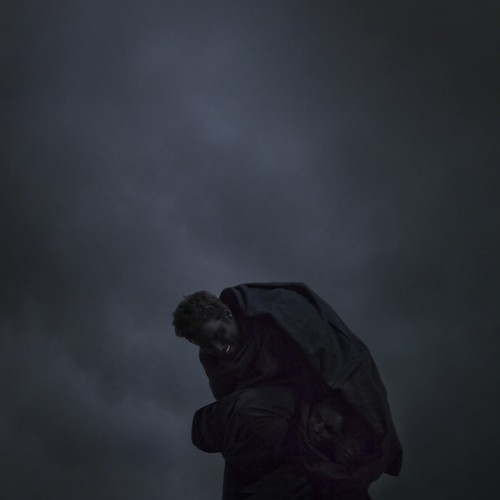It’s been a testing time for Baths, aka 24-year-old Californian Will Wiesenfeld. Fresh from touring his 2010 debut LP, Cerulean, he was struck down by a dire bout of E. coli, leaving him wholly debilitated; bedridden for months on end. The result of this extended convalescence is Obsidian, an altogether more stark, introspective affair than its elder sibling, shaped partly by its creator’s depressed disposition and partly by a wilful determination on Wiesenfeld’s part to explore darker, more sinister sounds and themes on the follow-up to an album that found its nearest touchstones under the loose ‘chillwave’ umbrella of Toro Y Moi and Washed Out.
The album’s cover (an apocalyptic shot of a man hunched over, protecting a female figure below) and title (obsidian is a, "hard, dark, glass-like volcanic rock formed by the rapid solidification of lava without crystallization," according to the Oxford Dictionary) suggest a much more austere affair than Cerulean (it means ‘sky blue,’ lest you weren’t aware). The song names, similarly, read as an inverse of its predecessor’s, with the teenage titular whimsy of ‘Aminals’ and ‘Indoorsy’ traded for the unforgiving, physical evocations of ‘Ironworks’, ‘No Eyes’ and ‘Earth Death’. It functions, therefore, to contrast Wiesenfeld’s debut in the way that Conor Oberst’s Digital Ash In A Digital Urn stood diametrically opposite to I’m Wide Awake, It’s Morning, displaying two distinct sides to Baths’ artistic persona.
‘Earth Death’, for example, is Baths’ most bruising cut to date by quite some distance. A pummelling exercise in future-rock that resembles Bjork or Massive Attack at their brutal best, its bass drums are incendiary and its crash cymbals burst open like fireworks as Wiesenfeld laments the sorry state of the planet: "My men cannot get out of being pulled into the earth / I’ve been done here, only time keeps me from the deadly urge / While we do next to nothing / We have always been the scourge." ‘Worsening’ and ‘Ossuary’, similarly, shape jagged sonic landscapes out of stuttering percussion, allied with a lyrical nihilism that was absent on Cerulean.
As well as a general shift from relentless sunshine towards cynicism and distrust, however, it should also be noted that Wiesenfeld displays a newfound confidence on Obsidian; in his songwriting, which is much more up front, structured and succinct, but most notably in his own voice, foregrounding his vocals where once they sought shelter under the subaquatic ebb and flow of myriad synth layers.
Its thematic focus is also much sharper. Each song is tethered to a central narrative of illness, intermittent hope and ultimate death. In its 11 tracks it moves through life’s inevitable cycle, zeroing in on mortality, but doing so lovingly and it climaxes with the gorgeous ‘Inter’, which provides the soundtrack to the afterlife as its luscious, quasi-monastic chants evoke Thom Yorke’s cracked falsetto weaving through gentle, jazz-infused rock akin to In Rainbows itself. As it fades, you’ll feel that intangible sense that binds together so many quality albums; that you’ve been on a journey.
The fact that the album takes death as its subject, however, is not to say that Obsidian‘s a complete volte-face, nor is it unrelentingly morbid. Indeed, at times, it must be pointed out, this is relatively straightforward electronic pop fare. It draws on The Postal Service, for example, throughout, with the trio of ‘Miasma Sky’, ‘Phaedra’ and ‘No Past Lives’ following the map left behind by Gibbard and Tamborello to a tee. Elsewhere, its pulverising, sequenced drums and Kaoss Pad vocals make use of the template laid down by The Notwist in their post-millennial rebirth, while ‘Ironworks’ and ‘Incompatible’ bubble and click like the Icelandic glitch-pop of múm.
If the album has one Achilles heel, it’s that Wiesenfeld’s voice has a tendency to grate, while his lyrics come unstuck on some of Obsidian‘s most crucial moments. Some of its refrains, particularly on the subject of sex, come across as juvenile, giving the album an unwelcome sprinkling of emo. "It isn’t a matter of if you mean it/ But it’s only a matter of come and fuck me," he sings on ‘No Eyes’ as he tries to pick apart the psychological side of loveless lust. ‘Incompatible,’ similarly, tries to tells the tale of early sexual fumblings but loses its poignancy through a delivery that comes off as clumsier than the scene itself; "Nurse this erection back to full health," is a particularly disturbing line.
That aside, this is an extremely strong, varied follow-up from an artist who is yet to fulfil his potential. Obsidian will be labelled as a laptop record, but it is much more than that. The soundscapes that Wiesenfeld has created here are much larger than their Macbook birth would suggest, while the determination to create an LP that is a rounded body of work comes across beautifully. Don’t be put off by its surface austerity; Baths tackles death head on, taking mortality as its subject but leaving hope as its lasting imprint.


